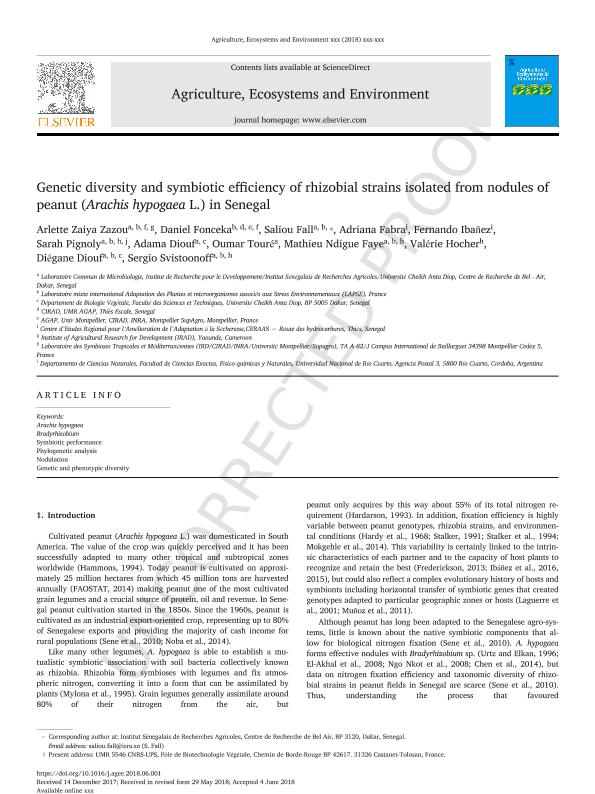Artículo
Genetic diversity and symbiotic efficiency of rhizobial strains isolated from nodules of peanut (Arachis hypogaea L.) in Senegal
Zaiya Zazou, Arlette; Fonceka, Daniel; Fall, Saliou; Fabra, Adriana Isidora ; Ibañez, Fernando Julio
; Ibañez, Fernando Julio ; Pignoly, Sarah; Diouf, Adama; Touré, Oumar; Faye, Mathieu Ndigue; Hocher, Valérie; Diouf, Diégane; Svistoonoff, Sergio
; Pignoly, Sarah; Diouf, Adama; Touré, Oumar; Faye, Mathieu Ndigue; Hocher, Valérie; Diouf, Diégane; Svistoonoff, Sergio
 ; Ibañez, Fernando Julio
; Ibañez, Fernando Julio ; Pignoly, Sarah; Diouf, Adama; Touré, Oumar; Faye, Mathieu Ndigue; Hocher, Valérie; Diouf, Diégane; Svistoonoff, Sergio
; Pignoly, Sarah; Diouf, Adama; Touré, Oumar; Faye, Mathieu Ndigue; Hocher, Valérie; Diouf, Diégane; Svistoonoff, Sergio
Fecha de publicación:
10/2018
Editorial:
Elsevier Science
Revista:
Agriculture, Ecosystems and Environment
ISSN:
0167-8809
Idioma:
Inglés
Tipo de recurso:
Artículo publicado
Clasificación temática:
Resumen
Cultivated peanut (Arachis hypogaea L.) was domesticated in South America. The value of the crop was quickly perceived and it has been successfully adapted to many other tropical and subtropical zones worldwide (Hammons, 1994). Today peanut is cultivated on approximately 25 million hectares from which 45 million tons are harvested annually (FAOSTAT, 2014) making peanut one of the most cultivated grain legumes and a crucial source of protein, oil and revenue. In Senegal peanut cultivation started in the 1850s. Since the 1960s, peanut is cultivated as an industrial export-oriented crop, representing up to 80% of Senegalese exports and providing the majority of cash income for rural populations (Sene et al., 2010; Noba et al., 2014). Like many other legumes, A. hypogaea is able to establish a mutualistic symbiotic association with soil bacteria collectively known as rhizobia. Rhizobia form symbioses with legumes and fix atmospheric nitrogen, converting it into a form that can be assimilated by plants (Mylona et al., 1995). Grain legumes generally assimilate around 80% of their nitrogen from the air, but peanut only acquires by this way about 55% of its total nitrogen requirement (Hardarson, 1993). In addition, fixation efficiency is highly variable between peanut genotypes, rhizobia strains, and environmental conditions (Hardy et al., 1968; Stalker, 1991; Stalker et al., 1994; Mokgehle et al., 2014). This variability is certainly linked to the intrinsic characteristics of each partner and to the capacity of host plants to recognize and retain the best (Frederickson, 2013; Ibáñez et al., 2016, 2015), but could also reflect a complex evolutionary history of hosts and symbionts including horizontal transfer of symbiotic genes that created genotypes adapted to particular geographic zones or hosts (Laguerre et al., 2001; Muñoz et al., 2011). Although peanut has long been adapted to the Senegalese agro-systems, little is known about the native symbiotic components that allow for biological nitrogen fixation (Sene et al., 2010). A. hypogaea forms effective nodules with Bradyrhizobium sp. (Urtz and Elkan, 1996; El-Akhal et al., 2008; Ngo Nkot et al., 2008; Chen et al., 2014), but data on nitrogen fixation efficiency and taxonomic diversity of rhizobial strains in peanut fields in Senegal are scarce (Sene et al., 2010). Thus, understanding the process that favoured peanut adaptation in Senegal by mining the extent of the diversity of the native strains found in peanut nodules and their efficiency in fixing atmospheric nitrogen is an important step to identify elite strains that can be used as potential inoculants to improve peanut productivity in Senegal through BNF. In this work, we studied the phenotypic and genetic diversity of rhizobia isolated from A. hypogaea grown in different agroecological zones in Senegal and compared these strains with efficient strains from Argentina and Zimbabwe.
Archivos asociados
Licencia
Identificadores
Colecciones
Articulos(CCT - CORDOBA)
Articulos de CTRO.CIENTIFICO TECNOL.CONICET - CORDOBA
Articulos de CTRO.CIENTIFICO TECNOL.CONICET - CORDOBA
Citación
Zaiya Zazou, Arlette; Fonceka, Daniel; Fall, Saliou; Fabra, Adriana Isidora; Ibañez, Fernando Julio; et al.; Genetic diversity and symbiotic efficiency of rhizobial strains isolated from nodules of peanut (Arachis hypogaea L.) in Senegal; Elsevier Science; Agriculture, Ecosystems and Environment; 265; 10-2018; 384-391
Compartir
Altmétricas



